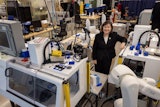Charles Darwin said, “It is not the strongest of the species that survives, nor the most intelligent that survives. It is the one that is the most adaptable to change.”
Manufacturing today is at a crossroads. On one hand, organizations are required to produce and deliver goods faster, more efficiently and on tighter budgets than ever before. On the other hand, the industry as a whole continues to lag behind others in its adoption and full use of innovative technology solutions—the very tools that can help companies reach their goals.
We can all see the future of manufacturing on the horizon, and business leaders understand how important it is to get on board. In a report by Deloitte, CEOs indicated that advanced manufacturing technologies are key to unlocking future competitiveness. Innovations such as artificial intelligence (AI), data analytics, Internet of Things (IoT), and machine learning are all intersecting to create massive value-based opportunities for the manufacturing industry. There is excitement and progression towards the industry’s digital transformation, but, with great change comes even greater trepidation.
A recent IDC article suggests that only 30 percent of manufacturers investing in digital transformation will be able to maximize ROI. The remaining 70 percent are hindered by outdated business models and technology. I’m not surprised by this. For a centuries-old industry, change will not happen overnight. The reasons run the gamut—from the complexity of technology changeovers and overall age of equipment, to plain and simple worker and executive reluctance to doing things differently.
As this year progresses, there are signs that manufacturers are warming to innovative technology and its potential. IDG’s 2018 State of Digital Business Transformation found that 87 percent of organizations in the manufacturing industry have adopted or have plans to adopt a “digital-first” business strategy. Further, McKinsey estimates that IoT will have a potential economic impact of up to $6.2 trillion by 2025 and may drive productivity across $36 trillion in operating costs across multiple industries, including manufacturing, health care, and mining.
As Industry 4.0 continues to gain speed, manufacturers that adopt now will reap a number of benefits through digital transformation that can help them better perform and outpace competitors. Here are three reasons why:
1. Data equals power. Digitalization delivers foresight, which was impossible before. The effect of predictive analytics on a business’ bottom-line is essentially limitless. With all the right data captured, a manufacturer can cut costs by minimizing downtime and limiting defects through checking patterns of previous failures against a real-time feed. Equipment can be networked together with sensors to tune in on maintenance issues and how to improve performance. Even better? All of this is can be done in a way that is faster than a human could ever process. In the automotive industry, manufacturers that have press stamping operations frequently face high levels of downtime due to machine failures. Operators that utilize predictive analytics are able to avoid not only major downtime events, but also huge costs of repair. For example, a bushing failure can cost around $1 million and take approximately sixteen weeks to repair. A failure can be avoided by implementing a temperature sensor close to the bushing that notifies the team in real time that something is about to go severely wrong.
2. Technology augments human potential for faster and better decision-making. Every person involved – from the shop floor to the top floor – has the power to make better and faster decisions and increase productivity through the power of technology. Time is freed up to handle more strategic and calculated business decisions. Factory floors will become safer environments for workers. Here is a situation that all of my industry associates in management positions can relate to: all of the shop floor is managed by hand with paper and boards that are there to support an operation system. Escalation events are notified through the radio or through WhatsApp and response is usually delayed. It is said that most people spend about 20 percent of their time searching for information, so if you hire five people, you will feel that only four showed up to work, because one of them is too busy looking for information to make decisions. The solution? A centralized knowledge center where all knowledge and information lives no matter who is working. This will drive productivity to unprecedented levels and augment the way all workers make decisions and solve problems.
3. Efficiency and productivity is boosted through on the job know-how collection and onboarding. The potential for improvements in productivity are immense. General Electric estimated that just a 1 percent improvement in productivity across its global manufacturing base means saving $500 million annually. Most organizations rely on their people to manage the collective know-how of the company but this is actually a major risk when those workers retire or leave for another job, taking all that vital information along with them. Through digitalization, companies can build permanent knowledge centers to fill with actionable data for years to come, easing new employee onboarding and reducing knowledge loss.
Manufacturing is critically important to both the developing and advanced world. The only way forward for the industry is for manufacturers to be bold, participate in pilot programs and adopt advanced technology like AI, machine learning, Big Data and IIoT to stay relevant and become as knowledgeable about their operations as possible. The manufacturers that do not take a leap of faith and unleash the power of this game-changing technology movement risk being left behind.
Porfirio is the CEO and Founder of Sensai.























